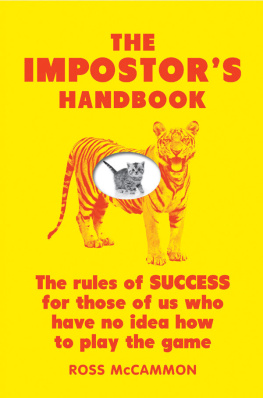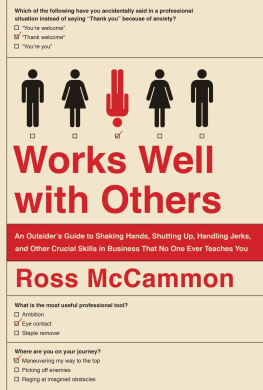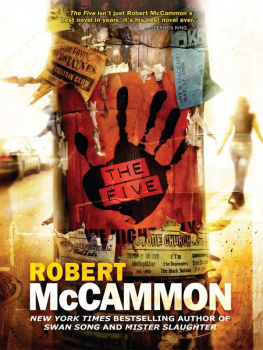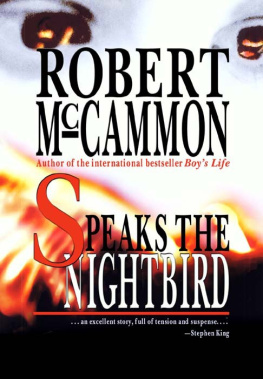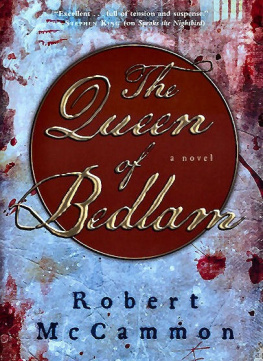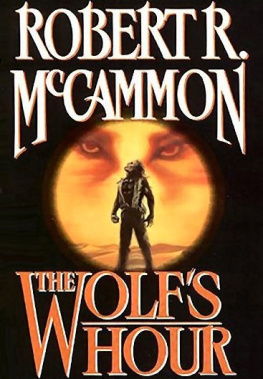


For Nina
Contents
Introduction
What Are You Doing Here?
Im going to make a few assumptions about you. If Im wrong, I hope youll read the rest of this book anyway. Also: Im sorry for misreading you. If Im right, well, Im clearly some sort of wizard. You look great, by the way.
Anyway, this is who I think you are. Youre smart. Youre talented. Youre ambitious. But youre not well-leveraged. You dont think you have an edge on the competition. You dont have hookups that you can exploit. You dont have a stellar pedigree, as if you are some sort of racehorse. You are not the spawn of a CEO and you cant call upon the powers of nepotism when things arent looking up. You dont know a lot of people.
Youre an outsider.
And your outsider status has made you a little uncomfortable. Youre not sure of yourself in a job interview. You dont know how to make a presentation or give a speech. Youre not sure what to order when youre at an important lunch.
Youre finding my use of quotation marks kind of stupid.
Its important for you to know that all of those things describe me too. Im pretty smart, kind of talented, and moderately ambitious, but when I unexpectedly (and, from my perspective, miraculously) got a call from Esquire magazine in 2005 to interview for an editor position, I felt crucially ill-equipped for the job. I worked at Southwest Airlines in-flight magazine (the Esquire of airplane magazines), had a degree from the University of North Texas (the Harvard of the northeastern Texas/southern Oklahoma region), and knew sort-of-important people, but they were all in Dallas (the New York City of... eh, never mind).
I thought that my circumstances would determine my eventual failure in New York. Because I wasnt the right type. And I didnt deserve it. I was an impostor, and I was going to be found out about a month in. (Rule: Nothing can be found out about a person less than a month into a job. Nothing. Because youre not seeing the real person. Youre seeing an agent for that person whose job it is to confusedly stare at the fancy electronic restroom faucets until someone comes along who knows how they work.)
The term impostor phenomenon was coined in 1978 by Georgia State University psychologists Pauline Clance and Suzanne Imes. Initially linked mainly to high-achieving women (but later seen as oftenif not more soin men), it can be broken down into three types of feelings: that you arent as successful as other people think; that your accomplishments can be chalked up to luck; and that even if youve attained success, it isnt all that impressive.
Since that initial research, psychologists have studied and debated the possible causes of impostorism. Is it a trait or is it a state of mind? Is it a situational condition or is it deeply rooted in how we were parented? Is it merely a reflection of an anxious personality? Or depression? Are people who describe themselves as frauds actually more confident than they let on, as some researchers have suggested? Is it a self-presentational strategysomething that people do, consciously or not, to seem extra humble or to lower others expectations of them?
This book isnt so concerned with why people feel like impostors but that people do.
And a lot of people do.
People like Supreme Court Justice Sonia Sotomayor: My first month as a judge I was terrified.... I still couldnt believe this had worked out as dreamed, and I felt myself almost an impostor meeting my fate so brazenly.
And Kate Winslet: Sometimes I wake up in the morning before going off to a shoot, and I think, I cant do this. Im a fraud.
And Chuck Lorre, creator/writer/producer of The Big Bang Theory and Two and a Half Men: When you go and watch a rehearsal of something youve written and it stinks, the natural feeling is I stink. Im a fraud. I need to go and hide.
And Alexis Ohanian, cofounder of Reddit: I have no idea what Im doing, and thats awesome.
And Tina Fey: You just try to ride the egomania when it comes and enjoy it, and then slide through the idea of fraud.
And Meryl Streep: You think, Why would anyone want to see me again in a movie? And I dont know how to act anyway, so why am I doing this?
When I got to New York, I felt unlike all of my peers. I didnt dress the part. I didnt know anyone important. I didnt know how to have a business lunch. I didnt even really know how to order a drink in a bar. (At this point, you may be questioning my ability to clean and feed myself. Bear with me.) I didnt know how to work at a big magazine and I didnt know how to live in a city like New York.
But a few months after working in New York, a truth came into focus: Everyone around me was an impostor, too. We all have insecurities. And I think successful people are successful because of them. Not in spite of them. Theres great energy in the spot on the Venn diagram where awkwardness and ambition overlap. Theres a great energy in weirdness.
Hugely important rule: Everyone is weird and nervous. No matter how famous or important, everyone is just really weird and really nervous. Especially the people who dont seem weird or nervous.
I came to see that the difference between those who are successful and those who arent isnt just talent or behavior. The people I came to respect the most werent any better minds or workers than I was (though they were talented and hardworking, believe me). They were just better at seeming better. They acted like they belonged. They seemed to claim success by performing its mechanics with confidence.
And as I met more and more interesting people (from people in my industry to famous actors and musicians as a part of my job), I began to realize that most of the so-called rules of success dont work. You dont have to sell yourself. You dont have to network. And you dont have to dress the right way (although that has its advantages). But you do have to understand why people do those things. And you have to comport yourself with integrity, even when you have no idea whats going onin the meeting room, at a business lunch, or at the bar after work.
I also learned that the problem is not being ignorant of certain customs or devoid of certain skills. The problem is letting your inadequacies get to you.
This is a book about success, but my angle on success is a sideways one. I am not going to spell out any sort of system or philosophy. This is a self-help book for people who dont like self-help books. Its less concerned with how to get a job than how to interview for one. Its less concerned with how to overcome a fear of public speaking than how to approach a podium. To borrow a now-overused construct from the military, this book is less concerned about strategy than it is about tactics. Its not about the what. Its about the how and who.
This book is about the seemingly small things, which are important for three reasons: The small things can cause crippling anxiety when you dont think you have a handle on them. (This kind of anxiety is totally unnecessary.) The small things are emblematic of greatness, signals to others that you are not messing around, code for integrity, dedication, and consideration. The small things are of huge
Next page
